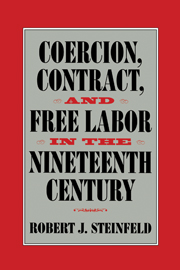Crossref Citations
This Book has been
cited by the following publications. This list is generated based on data provided by Crossref.
2004.
No Bond but the Law.
p.
83.
2004.
No Bond but the Law.
p.
253.
de la Escosura, Leandro Prados
2004.
Exceptionalism and Industrialisation.
2004.
No Bond but the Law.
p.
53.
2004.
No Bond but the Law.
p.
19.
2004.
No Bond but the Law.
p.
1.
2004.
No Bond but the Law.
p.
121.
2004.
No Bond but the Law.
p.
191.
2004.
No Bond but the Law.
p.
201.
2004.
No Bond but the Law.
p.
156.
Slater, Joseph E.
2006.
The American Rule that Swallows the Exceptions.
SSRN Electronic Journal,
Knowles, A.K.
2006.
“The white hands ‘damn them … won't stick’”: labor scarcity and spatial discipline in the antebellum iron industry.
Journal of Historical Geography,
Vol. 32,
Issue. 1,
p.
57.
Tucker, Eric
2008.
Shareholder and Director Liability for Unpaid Workers' Wages in Canada: From Condition of Granting Limited Liability to Exceptional Remedy.
Law and History Review,
Vol. 26,
Issue. 1,
p.
57.
Prasch, Robert E.
2008.
W. E. B. DU BOIS'S CONTRIBUTIONS TO U.S. ECONOMICS (1893–1910).
Du Bois Review: Social Science Research on Race,
Vol. 5,
Issue. 02,
p.
309.
Austin, Gareth
2008.
The ‘reversal of fortune’ thesis and the compression of history: Perspectives from African and comparative economic history.
Journal of International Development,
Vol. 20,
Issue. 8,
p.
996.
Joshi, Chitra
2008.
Histories of Indian Labour: Predicaments and Possibilities.
History Compass,
Vol. 6,
Issue. 2,
p.
439.
Stahl, Matt
2008.
Recording Artists, Work for Hire, Employment, and Appropriation.
SSRN Electronic Journal,
2009.
Abolition.
p.
372.
Steinfeld, Robert J.
2009.
Human Capital and Institutions.
p.
267.
Pope, James Gray
2009.
A Brief History of United States Labor and Employment Law.
SSRN Electronic Journal,



